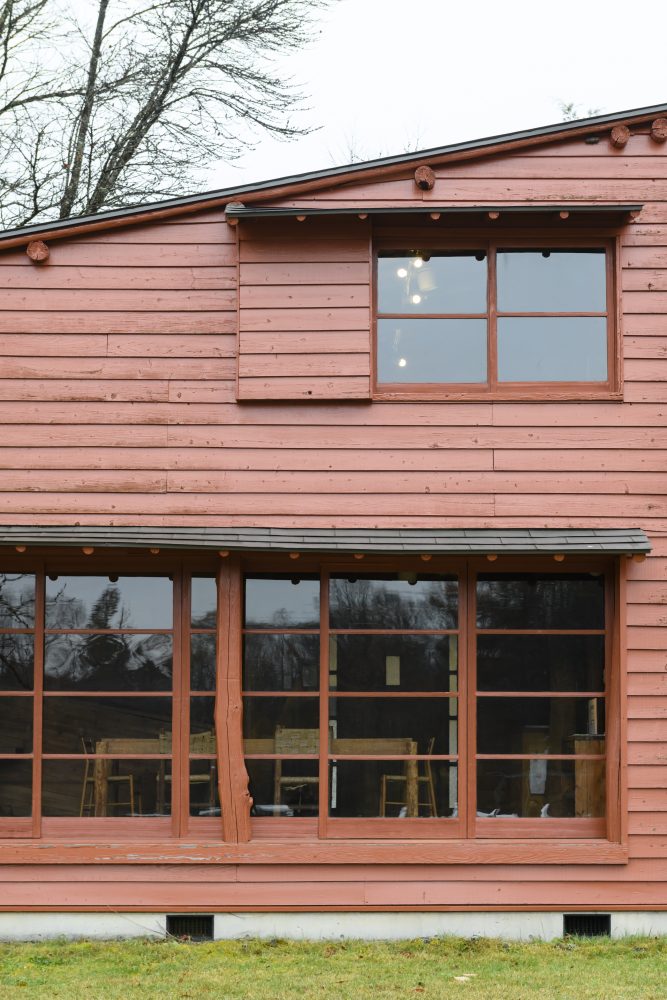
Series Window Terminology à la Carte
Vol. 1: Windows in Japanese
24 Apr 2018
- Keywords
- History
- Literature
Linguist Yasunari Ueda looks into the origins of words that mean “window” from around the world to explore the process through which the concepts of the word have expanded over the ages. Volume 1 in the series is titled “Windows in Japanese”.
1. Introduction
In the previous entry, I looked at the etymologies of words that mean “window” in various languages (the equivalent of what we call “mado” [窓] in Japanese) and classified them into three types. The groupings were based on which one of the window’s three original functions of admitting light, admitting air, or admitting views people focused on when they came up with the words to describe them. Through this series of entries, I will be looking more concretely at the words that mean “window” in the different languages one by one. The Japanese word “mado” meant “eye’s door” [目の戸, me no to] in its original form, so it belongs to the type of words for “window” that originally placed importance on the window’s function of admitting views.
In the first part of this piece, I will examine Japanese expressions containing the word “mado” while focusing mainly on their forms and meanings through a linguistic approach (2. Windows in Japanese from the Perspective of Linguistics). This will be a necessary preliminary step for comparing and contrasting the various words and expressions for “window” of the different languages.
In the second part, I will examine how native speakers of the Japanese language perceive windows (3. Windows in Japanese from the Perspective of the Human Cognitive Process). If the cognitive process common to all humans is indeed at work behind the various linguistic phenomena that have taken shape, how are windows perceived in a linguistic/cultural area where there are expressions that associate windows with eyes? I will be carrying out these linguistic analyses while keeping in mind such questions that should provide a foundation for a discussion on window culture.
2. Windows in Japanese from the Perspective of Linguistics
The four linguistic forms of simple words, compound words, idiomatic expressions, and proverbs will be the subjects of this study.
Simple Words
These include the word “mado” itself. I already discussed the meanings and formation of this word in the process of examining its origins in the previous entry.
Compound Words
These are words that contain the word “mado” as a component. There are “mado-” type compounds, in which the word for “window” comes at the front, such as “mado-akari” [窓明かり, “light from the window”] and “mado-waku” [窓枠, “window frame”], and “-mado” type compounds, in which the word for “window” comes at the end, such as “kazari-mado” [飾り窓, “ornamental window”] and “ura-mado” [裏窓, “back window”]. According to the Kojien dictionary, there are a total of 19 “mado-” type compounds, and they can be categorized into six types based on their meanings and usage. They are as follows:
1. windows as passages for light (“mado-akari” [窓明かり, “light from the window”] and “mado no tsuki” [窓の月, “moonlight from the window”])
2. components of windows (“mado-waku” [窓枠, “window frame”] and “mado-gi” [窓木, lit. “window-tree”; a tree that has a window-like opening in its trunk])
3. used as an object of the nominalized verb forming the second half of the compound (“mado-fusagi” [窓塞ぎ, lit. “window-sealing”])
4. spatial relationship to windows (“mado-giwa” [窓際, “windowside”])
5. accompaniments to windows (“mado-kake” [窓掛け, “window drape”])
6. euphemistic or idiomatic expressions (“mado no uchi” [窓の中, lit. “inside the window”; a young woman who is raised protectively indoors])
As for “-mado” type compounds, they can be grouped into the following eight categories identified by the Window Research Institute:
1. mechanism
2. form
3. material
4. position
5. building
6. environment
7. action
8. other
When considered from a linguistic perspective, these categorizations tell us the basis on which the various windows were named. Looking at these compound words, we can appreciate that as actual windows evolved and new variations of window components were invented, people came up with new names for the windows that emphasized the particular parts and functions that were modified.
Idiomatic Expressions
These are fixed expressions that are phrases and not complete sentences. Many accompany metaphorical images. There are a total of 11 Japanese idiomatic expressions that contain the word “mado” (according to the Nihon kokugo daijiten [Unabridged dictionary of the Japanese language], 2nd edition, 2006). Examples include “窓の下学問” [mado no shita gakumon, lit. “under-the-window studies”], “窓の蛍” [mado no hotaru, lit. “fireflies by the window”], and “窓の雪” [mado no yuki, lit. “snow by the window”], which are all expressions related to studying. They are used idiomatically to mean “to study hard” because they conjure images of a person reading beside a window to make use of the faint light coming in from outside.
Proverbs
These impart life lessons and wisdom in the form of complete sentences. The Zokushin kotowaza daijiten dai-ippan [Dictionary of folk beliefs and proverbs, first edition] (1982) and Koji zokushin kotowaza daijiten dai-nihan [Dictionary of historical facts, folk beliefs, and proverbs, second edition] (2012) published from Shogakukan list a total of eight proverbs that contain the word “mado”.
Some proverbs convey advice about everyday life, such as “桑の葉を軒や窓に刺しておくと落雷しない” [kuwa no ha wo noki ya mado ni sashite okuto rakurai shinai, “Lighting will not strike if mulberry leaves are fixed to the eaves and windows”].
“窓から出たり入ったりすれば死ぬ” [mado kara detari haittari sureba shinu, “You will die if you enter or exit through a window”] and “窓からものをやりとりすると罪人になる” [mado kara mono wo yaritori suruto tsumibito ni naru, “You will become a criminal if you exchange goods through a window”] are sayings that admonish people not to use windows in ways that deviate from their intended purposes. The saying “目玉の腫れ物は流しの窓から握り飯を貰って食えば治る” [medama no haremono wa nagashi no mado kara nigirimeshi wo moratte kueba naoru, “Swelling of the eyeball will heal if you eat rice balls passed to you through the sink window”] suggests that because ailments of the eye are abnormalities, one should take the “fight poison with poison” approach and deal with them by using windows in a way that deviates from normal use. It should be mentioned that all of these are proverbs that have been passed down in provincial areas. They are noted to have been documented in the prefectures of Iwate, Fukuoka, and Aomori, respectively.
There are also sayings that urge people to observe customs and conventions. They are “葬式を窓や石段の上から見れば近所に不幸がある” [sōshiki wo mado ya ishidan no ue kara mireba kinjo ni fukō ga aru, “A misfortune will occur nearby if you look at a funeral from a window or from atop a flight of stone steps”] and “金神の方向に窓を開けると悪い” [Konjin no hōkō ni mado wo akeruto warui, “It is bad to open windows in the direction of the Konjin“] (The latter is a custom observed in building construction in which people avoid orienting things in the compass directions corresponding to the locations occupied by the Konjin [an itinerant deity] in that particular year).
There is also a proverb that originated from a foreign language. It is the saying “貧乏が戸口から入って来ると、愛は窓から飛び出る” [bimbō ga toguchi kara haitte kuruto, ai wa mado kara tobideru], which is a Japanese translation of the English proverb “When poverty comes in at the door, love leaps out the window”.
When we consider language’s infinite creative potential and the fact that humans think with the help of words, there is one thing that can be said from the viewpoint of linguistics about the future possibilities of compounds in particular, and that is that as windows continue to be evolved, the vocabularies of the different languages will also be enriched, and these inventions will in turn no doubt stimulate the human imagination and contribute to the further creation of new variations of windows.
3. Windows in Japanese from the Perspective of the Human Cognitive Process
In this section, I will consider windows in the Japanese language while focusing on idiomatic expressions. As mentioned earlier, many idiomatic expressions accompany metaphorical images. In looking at the windows as they appear in idiomatic expressions, I will think about the cognitive process through which native speakers of Japanese perceive windows.
Examples of expressions in which the word “mado” is used figuratively include “窓が開く” [mado ga aku, lit. “the window opens”], “窓から鑓” [mado kara yari, lit. “a spear from the window”], and “窓を開ける” [mado wo akeru, lit. “open the windows”]. The first expression is used to describe the occurrence of a loss. The window is understood as a “hole”—a reading which is itself idiomatic—that has opened up in a place normally closed. The second expression is used to describe unexpected danger. In this expression, the window is understood as a vulnerable place that, unlike a wall, creates the risk of the safe interior coming into contact with the dangerous world outside. The third expression is used when the closed eyes and blocked nostrils of a person with smallpox reopen. In this case, the eyes and nostrils are likened to windows.
Recall that the Japanese word “mado” originated from the expression “eye’s door” [目の戸, me no to]. There are two sides to this expression. First, it likens a house to a human face and refers to the window metaphorically as an eye. Based on the meanings of the idiomatic expressions above, however, we know that this is not all. It also connects the various functions of the window with those of the eye. Let us now look more closely at what these functions are.
Windows as “Holes”
A window’s ability to be opened and closed suggests the possibility that a “hole” can be created in a wall. It is understandable why windows are associated with eyes as they can be opened and closed, unlike other “holes” in the human face, such as the ears and nostrils. As we can tell from the expression “窓が開く” [mado ga aku, “the window opens”], when a place that normally should be closed opens, it is perceived as a “hole” in the sense that something is lost. Likewise, when something that is normally supposed to be open becomes closed, it is considered to be a hindrance. The expression “窓を開ける” [mado wo akeru, lit. “open the windows”] thus serves to describe instances where such blockages are cleared.
Windows as Symbols of Safe Interiors and Hiding Places
What the idiom “窓から鑓” [mado kara yari, “a spear from the window”] first tells us is that people consider houses to be safe places that provide shelter from the rain and wind and protection from the dangers of the outside world. If a spear were to come through the window, one’s safety would be threatened. Here, “window” is used as a metonymy for “house”. The same can be said of the expression “深窓のお嬢様” [shinsō no ojōsama, lit. “damsel in a deep window”; a young woman of good upbringing who is brought up protected from the outside world deep within a mansion]. The window symbolizes the house, which is understood as a place where precious things can be hidden and protected from the outside.
As can be inferred from expressions such as “目は人の眼” [me wa hito no manako, “your person shows in your eyes”], in the world of the Japanese language, it is believed that one can look into a person’s personality and hidden secrets through their eyes. Windows, by extension, are also considered to serve this function.
Windows as Contact Points with the Outside World
Windows are also contact points where the inside and outside worlds meet. Windows are necessary features for looking out from inside, just as eyes are necessary organs for people to see the external world. This is why people consider it an inconvenience when they cannot open their eyes due to illness and why people say “窓を開ける” [mado wo akeru, “open the windows”] when this inconvenience is remedied.
4. Conclusion
Windows are likened to eyes in the Japanese language. Considered from a cognitive perspective, the fact that Japanese people liken living spaces to the body tells us that they use the human body as a basis for perceiving and conceptualizing the external world. Furthermore, we now understand how windows are also associated with eyes for their functional aspects, such as their ability to be opened and closed, their significance as symbols of a safe interior for protecting precious things, and their role as contact points with the outside world. What can be said about other languages? In the upcoming entries, I will continue to examine windows in different languages through the approach of linguistic analysis.
Yasunari Ueda
Born 1948 on the island of Tokunoshima in the Oshima District of Kagoshima, Japan. Graduated from the Department of Philosophy in the Faculty of Letters of Kobe University and received a master’s degree from the Hiroshima University Graduate School of Letters. Taught as a teaching assistant and lecturer at the Faculty of Humanities of Chiba University, an assistant professor at the College of General Education of Kyushu University, and an assistant professor at the School of Letters of Hiroshima University before becoming a professor at the Graduate School of Letters of Hiroshima University in 2001 (retired in 2013). Doctor of Letters. Specialist of modern German studies. Known particularly for his research on Japanese and German idioms, the linguistic theories of Karl Bühler (1879–1963), German sociolinguistics, and applied linguistics (foreign language education). Currently working on making proposals for vocabulary learning based on the findings of his comparative research on Japanese and German idioms.

MORE FROM THE SERIES
-

Window Terminology à la Carte
Windows in the Tokunoshima, Amami Region: Boma Shimaguchi Dialect
26 Sep 2022

Window Terminology à la Carte
Vol. 6 : Window Culture Studies—Towards Further Linguistic Explorations
18 Dec 2018

Window Terminology à la Carte
Vol. 5: A Contrastive Linguistic Analysis of Words for “Window”—Based on Comparative Analyses of Japanese, German, English, and Italian Idioms
27 Nov 2018

Window Terminology à la Carte
Vol. 4: Windows in Italian
11 Sep 2018







